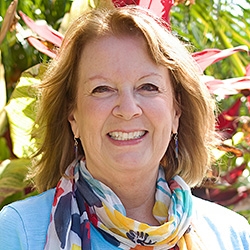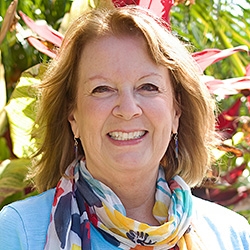

Search Results: truth
-
Trainer Tip: One of the swiftest ways to close our hearts is having judgmental thinking or looking to get our way. How open are you when you're in this mode? The goal in peaceful living is to approach our relationships with an open heart. Start conversations today with an intention to connect with other people.
-
- Inscrease compassion for yourself through understanding why your capacity may lag so far behind your commitment and what you can do to bridge the gap
- Higher Compassion for your children as you understand better what life is like from within their own experience rather than from the outside looking in
- Surge in energy that you can put into new conversations with them designed to make agreements that are based on the truth of where you all are rather than on any "should"
-
Control may help us feel safe in an unpredictable, unsafe, wild world. Wanting control may be a response to shielding ourselves from feeling fear and being aware of our vulnerability. The more we insulate from fear, discomfort, and vulnerability, the more we are cut off from aliveness; we can become more anxious, and depressed. The more we control the more we are disconnected from empathy and care. With aliveness come joy, peace, love, awe.
-
Trainer Tip: It can be painful spending our days pretending we’re not who we are. For example, we may try not to be passionate in our expression because if we think its “too much” for people. This can lead to trying to figuratively to squeeze ourselves into small spaces in life. Alternatively, we can choose who to share our passion with, and speak our truth to. Today, notice what you need and to work actively to meet your needs.
-
Even leaders we admire may exhibit behaviors that could be labeled as abusive, at least slightly. This includes not treating followers as equals, using charm, and hiding or twisting truth. In such scenarios a key reason for this is loneliness. If we're using our work and position primarily to gain for appreciation, acknowledgement, and acceptance then we need to examine our own loneliness. We need feedback to keep such conduct in check.
-
Feel confident building the relationship you want with your children, inclusive and real.
-
Learn the basics of NVC to reduce stress, improve connection and respond with clarity.
-
Bring nonviolence to life through facilitation, integrate love and courage in every group process.
-
Fear can show up as a thought or feeling. When we think and dwell on fear and get stuck, fear becomes our worst enemy. For a healthier approach, discover what brings up the emotion of fear by looking for the unmet need behind it. Next, identify the stimulus for the fear. Then satisfy the need(s) with suitable strategies. You can also reassure yourself based on the truth, evidence, and facts. Or ask a friend for support.
-
Dear friends,
#UnlockYourAuthenticVoice
This has been on my mind lately. What does it mean to unlock my authentic voice? How do I talk about things that matter to me without creating emotional distance between myself and others? I’ve found this especially challenging after the US presidential election this month— half the voters are devastated by Donald Trump’s election, and the other half are elated. The extremes are vast. Sometimes imagining a coming-together feels hopeless.
-
-
Hello,
I’m Iris Bawidamann. When Mary reached out to me asking if I’d write this letter, I sat for some time meditating on what is alive for me and what I want to share with you… This is what surfaced for me… Fear sits with me—on my shoulders, in my chest. A familiar presence I consciously keep in check so it doesn’t take over. Watching global politics, conflicts, and rising polarization, I often feel overwhelmed. The world is shifting.
-
- Learn how every decision we make perpetuates the status quo or brings us closer to the vision of a world that works for all
- Find out about our big brain capacity to integrate needs, impacts, and resources to make decisions that work for everyone
- Understand why power differences interfere with collaborative decisions and what can be done about it
- Discover tools that support collaboration in larger groups and organizations— even across power differences!
-
Anger and resentment can signal unmet needs. Through mourning those needs and practicing self-empathy, we may let go of blame, embrace reality, and reclaim responsibility for fulfilling our own needs. This process may lead to emotional transformation through conscious reflection, and a new outlook.
-
Dear friends,
This morning, I woke up thinking about a poignant moment from a few years ago. My wife, Kim, and I were driving down a busy 4-lane road, and we were in a hurry to get somewhere important. Then we saw a mama duck with many small ducklings trying to get across the street. Kim pulled over, and we both hopped out to stop 4 lanes of traffic so Mama Duck could get across with all her ducklings. The last one had some kind of injury, so it took a very, very long time for all of them to make it across.
-
During a crisis like the COVID-19 pandemic, we can draw upon inner and outer resources: gratitude, awareness of our senses and breath, plus compassion for self and others. We can also expand our understanding to curtail fear -- and limit the amount of time and energy we spend fighting and resisting the truth of what’s happening.
-
How can we hold love, understanding and compassion -- and still confront people about the harmful impact of their actions, hold them accountable, take action, speak truth and advocate for change... all in a manner fully aligned with our values and vision? Read on for how we can do accountability; what kind of action we take and with what motivation; and what our movements for change can look like from this lens.
-
In pandemic many are asked to stay home. If we are experiencing violence at home we're also most at risk of harm or death if we leave. There are also less visible pieces at work. In this situation, acknowledging our pain, needs and experience can lighten the internal load to meet what is real, and claim our truth. We can do the same for our kids. This can open more pathways forward, and provide strength to leave when its more viable.
-
With a world in crisis, steeped in incomprehensible violence, how do we then live? What, if anything, could turn this around? If we're all dying, let us die loving everyone, including ourselves and our former enemies. Let us come together behind wanting everyone to be free. Let us align means with ends as we envision a world that, against all odds, moves towards working for all of life. Let us dedicate our lives to service, to courage, to speaking truth, and to love.
-
However indirectly expressed, any judgement or criticism is about the person's own thoughts, feelings, needs, and requests.This awareness can help you take people's comments less personally, and give you options: silent self-empathy, standing in your truth, contact and curiosity, and honest expression.

Quick Links
Subscription Preferences
Stay In Touch!
Looking for ways to keep up with NVC Academy news, get special offers, free resources, or words of inspiration? Here are five ways to stay engaged:
















